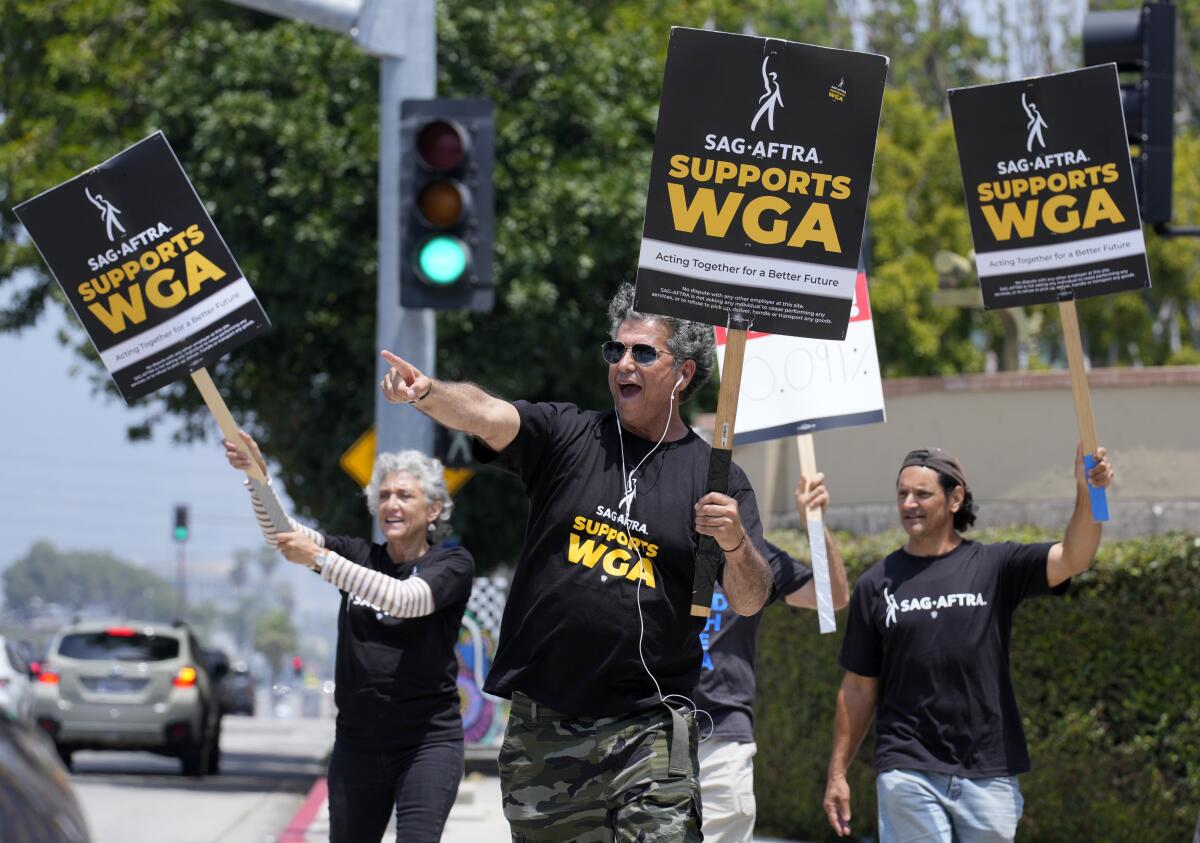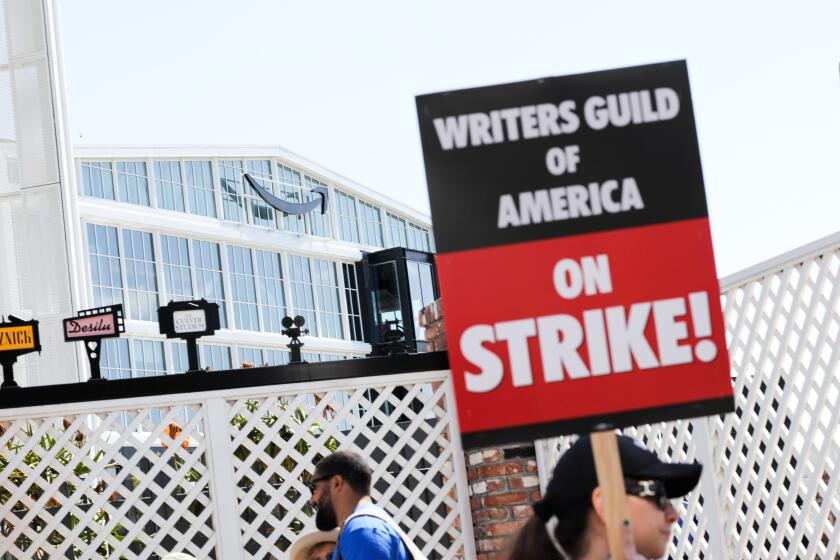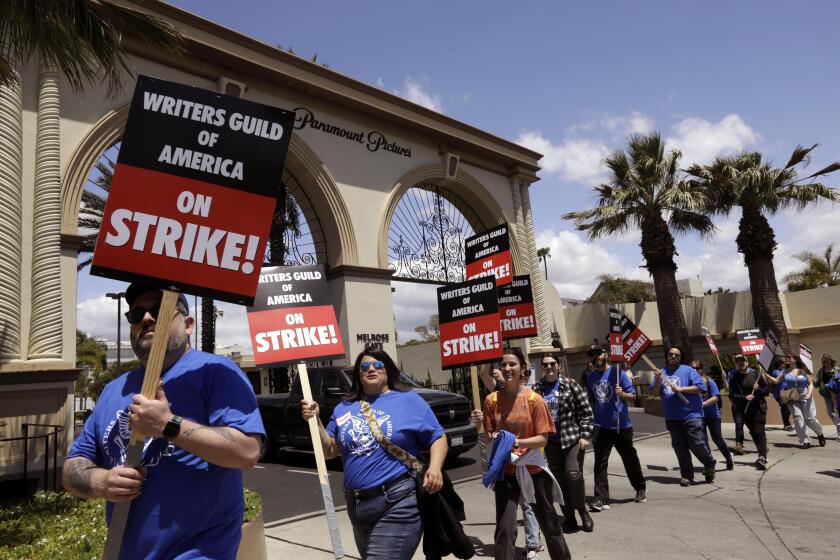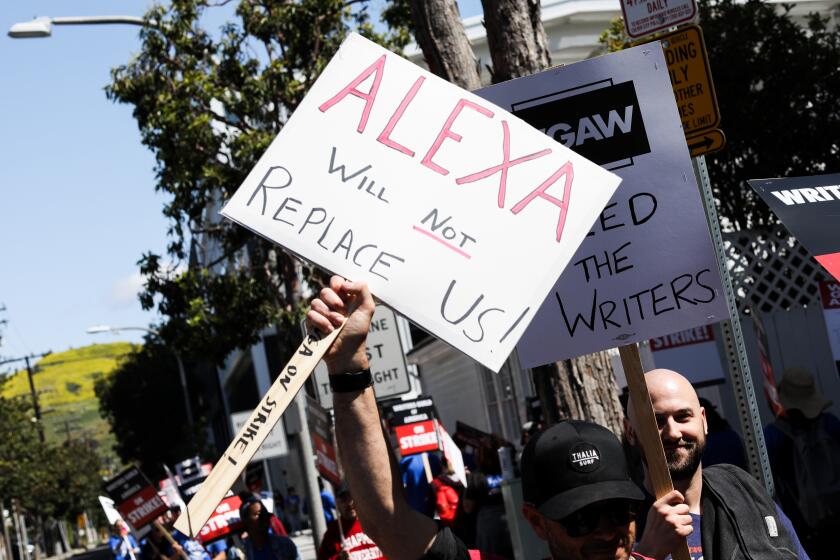Editorial: A Hollywood mess. Writers are striking, and actors may too, over the future of the industry

After six weeks on the picket line, Hollywood writers could soon be joined by actors, whose union, SAG-AFTRA, voted to authorize a walkout if it can’t reach a deal with studios by the end of the month.
A work stoppage by two major Hollywood unions would be a serious blow to the industry — and to Los Angeles County, where film and television are an important economic engine.
To make matters worse, the strike — or strikes — could carry on for weeks or months, observers suggest, because the issues being hashed out are challenging and existential for the industry. The digital revolution has significantly changed the business model, particularly for television shows. The arrival of artificial intelligence could upend things again, if software takes over acting and writing work.
The last strike cost the local economy $2.1 billion and 37,700 jobs. Los Angeles has an interest in seeing a fast and just resolution in the standoff between writers and the studios.
Writers and actors see their careers at stake and have been steadfast in demanding contract terms that protect their income and ensure that there are good jobs for the next generation of creators and performers. Media companies are also still learning to navigate the world of streaming. After going on a spending spree in recent years to launch services with prestige shows and movies, few companies have managed to turn a profit on streaming and are under pressure from shareholders to cut costs and figure out a business model that works.
Negotiations begin Wednesday between SAG-AFTRA and the Alliance of Motion Picture and Television Producers, which includes Netflix, Amazon, Apple, Disney, Discovery-Warner, NBC Universal and Sony. The Directors Guild of America reached a deal with the alliance over the weekend, with increased pay and streaming compensation.
The Writers Guild of America and the studios have not returned to the bargaining table since the strike started May 2, which is disappointing considering how much is at stake for the industry and the people who rely on it for their livelihood.
A CEO suggested the WGA strike would end soon because writers love working. Studies show passionate workers are the most likely to be taken advantage of.
There has been a slowdown in local production since the writers’ strike began. Normally, dozens of scripted television shows would be filming at this time of year, according to FilmLA, which handles permits for the city and county. Instead, just one TV series had a permit last week, and the agency couldn’t say whether the production was underway. Late-night talk shows have gone dark, as have other TV and some film productions across the country.
If SAG-AFTRA can’t reach an agreement with the studios by June 30, the second strike will shut down the industry, possibly for months.
The Writers Guild represents 11,000 writers for film and television. SAG-AFTRA represents 160,000 performers and broadcasters. But thousands more will be out of work: camera operators, set decorators, production assistants and others who work on sets.
The financial pain will reach beyond those directly employed in the industry. The 100-day writers’ strike in 2007-08 cost the local economy an estimated $2.1 billion and 37,700 jobs, according to a Milken Institute analysis.
We’ve been grappling with the consequences of machines replacing people for nearly 1,000 years. The idea that automation necessarily creates shared prosperity is an illusion.
Like the Writers Guild, SAG-AFTRA argues that the move to streaming has hurt performers’ income by paying less in residuals (fees for re-aired shows) than traditional broadcasting. The streaming model has also made it harder for writers and actors to maintain stable work with solid pay. Streaming series typically have fewer episodes than broadcast shows, hire fewer writers, dismiss most writers when shooting begins and schedule long hiatuses between seasons. These changes make it “increasingly difficult for our members to achieve and maintain a middle-class lifestyle working as a performer,” according to SAG-AFTRA.
The actors union has unique issues, including seeking new rules and limits on self-taped auditions. Actors say having them stage and film their auditions, rather than appearing in person — a practice that took off during the COVID-19 pandemic — saddles them with extra labor and expenses for which they are not compensated.
Both unions are pushing for rules on the use of AI, including guardrails against replacing human contributions and ensured compensation if their work or likeness is used. So far, the studios have balked at including such language in the contracts.
No one can say whether AI could replace writers and actors or will just replace some tasks and complement creators’ work. This fight won’t be easily resolved when the technology is so quickly evolving. Nevertheless, the unions and studios should be at the negotiating table — along with AI experts — to come up with a reasonable framework that provides basic protections in these early days.
The sooner all sides get into serious negotiations to protect the creators, the performers and the long-term viability of the industry, the better it will be for everyone. Hollywood doesn’t need one strike — much less two — disrupting lives and the L.A. economy.
More to Read
A cure for the common opinion
Get thought-provoking perspectives with our weekly newsletter.
You may occasionally receive promotional content from the Los Angeles Times.













